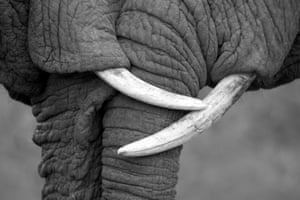China’s ivory ban sparks dramatic drop in prices across Asia
June 2, 20171.3K views0 comments
The price of raw ivory in Asia has fallen dramatically since the Chinese government announced plans to ban its domestic legal ivory trade, according to new research seen by the Guardian. Poaching, however, is not dropping in parallel.
Undercover investigators from the Wildlife Justice Commission (WJC) have been visiting traders in Hanoi over the last three years. In 2015 they were being offered raw ivory for an average of US$1322/kg in 2015, but by October 2016 that price had dropped to $750/kg, and by February this year prices were as much as 50% lower overall, at $660/kg.
Traders complain that the ivory business has become very “difficult and unprofitable”, and are saying they want to get rid of their stock, according to the unpublished report seen by the Guardian. Worryingly, however, others are stockpiling waiting for prices to go up again.
Of all the ivory industries across Asia, it is Vietnam that has increased its production of illegal ivory items the fastest in the last decade, according to Save the Elephants. Vietnam now has one of the largest illegal ivory markets in the world, with the majority of tusks being brought in from Africa. Although historically ivory carving is not considered a prestigious art form in Vietnam, as it is in China, the number of carvers has increased greatly.
The demand for the worked pieces comes mostly from mainland China. Until recently, the chances of being arrested at the border slim due to inefficient law enforcement. But the prices for raw ivory are now declining as the Chinese market slows; this is partly due to China’s economic slowdown, and also to the announcement that the country will close down its domestic ivory trade. China’s ivory factories were officially shut down by 31 March 2017, and all the retail outlets will be closed by the end of the year.
Other countries have been taking similarly positive action on ivory, although the UK lags behind. Theresa May quietly dropped the conservative commitment to ban ivory from her manifesto, but voters have picked it up and there has been fury across social media.
Another told investigators that “whereas previously it had been easy to carry stuff over into the border into China, now a few people have dropped out of the business completely”.
Illustrating how far prices have dropped, one illicit sale was recently made to Hong Kong of four tusks weighing 204kg for a record low of $400/kg. Dan Stiles, an independent consultant who has been investigating ivory markets for 15 years, received the information via email from an Indian man now living in Canada who had made the sale. “That’s unbelievable,” Stiles said. “Three years ago he [the trader] was offered $650/kg by the Daxin Ivory Carving Factory in Guangzhou and turned it down. He just gave up trying to get a decent price – it was money for his daughter’s education.”
The price of wholesale raw ivory in China dropped by two thirds in the last three years, during the time that China’s government made commitments to cracking down on the trade, according to research released in March by Save The Elephants. It has been seen by conservationists as significant progress for the protection of elephants. Iain Douglas-Hamilton, president and founder of Save the Elephants told the Guardian: “There is now greater hope for the species”.

However, falling prices do not necessarily reflect a reduction in demand. Oversupply could cause the decline in prices, according to Stiles, who suggests there is now so much raw ivory that most people are “not willing to pay higher prices”.
He also believes certain big dealers may be stockpiling the ivory, either because they think the ban will only be temporary, or because they are moving into the illegal trade.
“I think there will be an increase in illegal selling to cover the gap made by the closure of legal markets,” Stiles said.
“As long as the poaching continues at these high rates, it looks like there are still quite high volumes of ivory in spite of the seizures that have been made,” he added. According to according to Cites Mike programme (Monitoring the Illegal Killing of Elephants) poaching levels peaked in 2011 and have since stabilised, at levels that “remain unacceptably high overall”.
However, Stiles is keen to stress that it is still too early to see the full impact on poaching across Africa from China’s domestic ivory ban, which will be fully enforced at the end of this year. “Let’s see where we are at the beginning of 2019. If poaching rates haven’t gone down significantly by then, then elephants are in real trouble.”
Many conservationists believe that the ban is pointing in the right direction for elephants, with Verheij from the WJC saying, “It’s really encouraging”.
Vigne agrees and points out that in the future this ban will have an impact on the big trading networks. “If they have any sense they won’t want to trade if the prices are dropping like that,” she said. But ultimately, she added, the key is law enforcement. “Punishment is the biggest deterrent. That’s what has to be focused, so the illegal markets will slowly become marginalised.”
Courtesy theguardian.com
